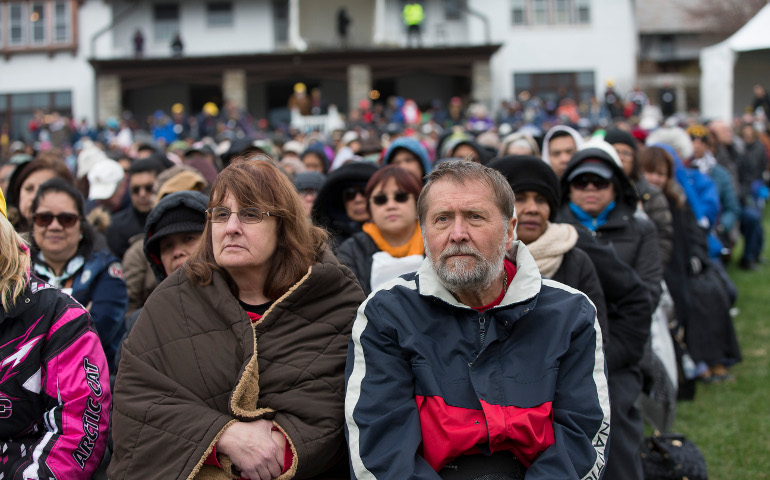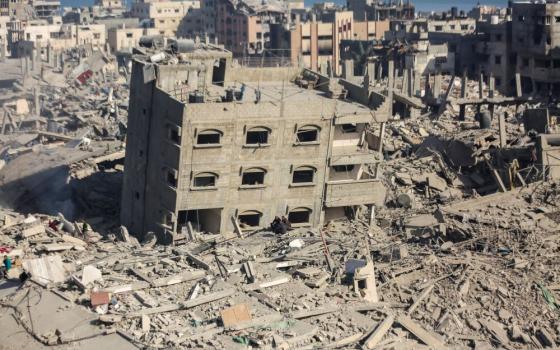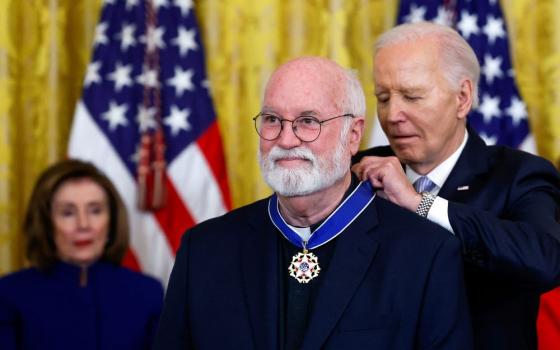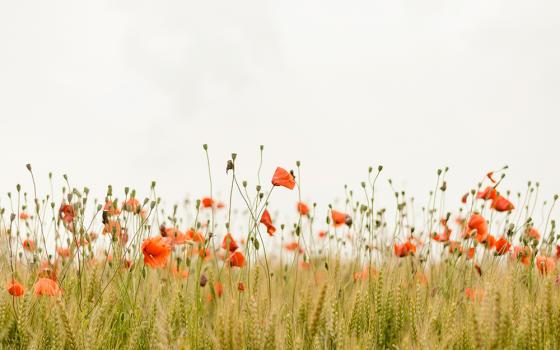
Pilgrims attend the Divine Mercy Sunday Liturgy April 23 at the Shrine of the Divine Mercy in Stockbridge, Massachusetts. (CNS/Octavio Duran)
In reflecting on this Gospel over the years and again today, I am drawn to wonder (and perhaps you are too) why, when we think about Thomas and this episode, we remember his doubts and not his faith. We call him "Doubting Thomas." Why not "Believing Thomas?" He falls down at his knees and says, "You are my Lord and my God." We don't do that with Peter. Peter lied about Jesus, denied him. We don't call Peter "Lying Peter" or "Denying Peter."
We recognize that he overcame that failure, so we forget about what he failed to do or what he did wrongly. But with Thomas, somehow we hang on to the idea that he doubted. I think there's reason for that, and it's expressed, actually, by Jesus where he tells Thomas, "You believe because you see, don't you? Blessed are those who have not seen but believe." That includes all of us. Certainly, part of our active, living out our faith is that we have moments of doubt and we wonder is it really true? Is Jesus the Son of God? Did he rise from the dead?
|
Second Sunday of Easter |
We don't have the opportunity like Thomas did and the others did to experience Jesus — see him, eat with him, touch him, and so on. We're among those who at times experience that doubt, but then we choose to believe. "Blessed are those who have not seen but believe." So we kind of hang on to Thomas as the doubting Thomas because he is more like us. We never have been in a situation like Peter where we're challenged and going to deny Jesus, "I don't know the man." But we are in situations like Thomas.
It's helpful, I guess, for all of us to think about Thomas not as the believing Thomas, but as the doubting Thomas and the one who went beyond his doubt to believe. He's, in that way, a very good model for us. We're thankful that Thomas held out for that extra week and finally came and realized that Jesus is the Christ, the Son of the living God, and that's our faith too. During this past week, we've been celebrating that faith in the resurrection and we'll continue throughout the Easter season to celebrate the fact that Jesus did pass through death to new life, and that he passed on that new life to us through our baptism that we share with him in his risen life.
We're his brothers and sisters in a very deep and special way. As we continue to celebrate, we need also to listen to our first lesson from the Acts of the Apostles in a special way because this shows us what happened. That Easter Sunday night, Jesus told the disciples, "As God has sent me, I send you." Then he gave them, first of all, the task to bring about reconciliation, "The sins you forgive, they're forgiven. The evil you restrained, it's restrained." He's begging them to be reconciled and to make reconciliation — an important part of their life.
But then also as we hear in the Acts of the Apostles, they go on to continue to function as the community of his disciples, become his church, which is what we are — the church of Jesus. In this brief passage from the Acts of the Apostles, we learn what it means to be the church of Jesus. A couple of very important things: first of all, it's a community of people. They gathered together, Luke tells us, at the temple on a regular basis to pray, to deepen their sense of community with one another and their shared life in Jesus, but also to reflect on his teachings and to follow those teachings more fully.
One of the extraordinary things that Luke tells us was not only did they gather together for the breaking of the bread and for prayer, but they also took care of all those who were in need. No one was in need in their midst because they shared what they had. It was a beautiful kind of community of life. They understood that it was their responsibility to share with one another. So they brought their material goods to Peter and the disciples and left them there to be given to those who were in greater need. This is what it means to be church: "As God has sent me, I send you."
All of us here today are God's church. God is sending us to do the same things that those first disciples did. God has called us together to be God's community of people. We come together in prayer. Perhaps this time of the year, we remind ourselves that at times we have failed to be as faithful to coming for Sunday liturgy, gathering together as a community to pray. We also realize that there are those in our world who are in desperate need, and we have to do a better job of sharing the goods of our own community with those who are in need.
That's something that needs to be done at every level of our life. We can do it here at the parish. At church we bring our gifts and they're distributed and shared, but we have to do it on a broader scale too within our larger community. During the next couple of weeks, if we're keeping up on what is happening with the new administration of our government, this is a time when they're going to be developing a budget that will be a way of distributing the goods that we gather together from all the people and disperse for the benefit of all, we hope. We have to make sure that that budget includes care for the poor, those who are often left out. It's part of our task as disciples of Jesus.
If we really want to be a community like that first community of disciples, we have to look beyond our immediate family, our immediate community, our immediate neighborhood to our whole nation, and even beyond that to other parts of the world where there is suffering and violence and people fleeing from poverty, fleeing from violence. We have to develop that spirit of being one human family. That's what the first disciples did. That's what's being described in the Acts of the Apostles today. That's the goal that all of us must try to achieve, in so far as we can, through our efforts to influence what happens with our national leaders, but also our local leaders, and within our neighborhoods.
Yes, it's a great blessing that we have come to know Jesus as the Christ, the Son of the living God, and that we have come to celebrate his passage through death to new life, and that we celebrate that gift that he gives to us when he breathes on us, shares with us his Holy Spirit and allows us to be his sisters and brothers. These are great blessings, but they carry the responsibility to use those blessings to reach out beyond our immediate circles and to extend God's blessings, God's goodness, God's love — all the things that God has given for all, that we try to make sure we find a way to share them with all.
It's a great challenge, but it's a great blessing. We thank God that we know Jesus as our risen Lord. We thank God that Jesus has sent us forth to carry on his work, and we commit ourselves to do that work in the best way possible, that we try to be like those first disciples and see where there is a need, fulfill that need, bring God's goodness and God's love to every part of our world.
[Homily given at St. Philomena parish, Detroit, Michigan, April 23, 2017. The transcripts of Bishop Thomas Gumbleton's homilies are posted weekly to NCRonline.org. Sign up here to receive an email alert when the latest homily is posted.]








